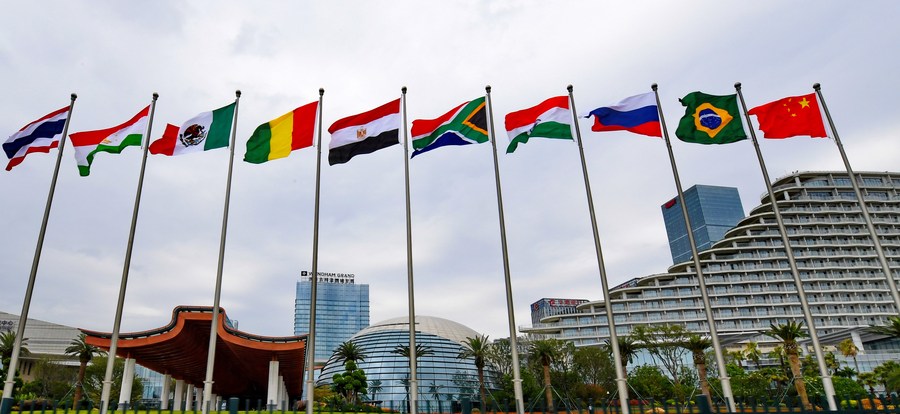BRICS 'wall' mounts resistance to dollar
By HENG WEILI in New York | CHINA DAILY | Updated: 2023-07-19 07:13

Greenback weaponization prompting efforts to likely introduce new currency
A potential world-changing financial event is on the horizon next month.
The nations that make up the BRICS — Brazil, Russia, India, China and South Africa — reportedly plan to introduce a joint currency backed by gold when they meet for their summit on Aug 22-24 in Johannesburg.
The BRICS venture underscores an effort to "de-dollarize" amid concerns over Washington's ability to "weaponize" the greenback through economic sanctions.
"BRICS is set to introduce a new currency backed by gold, in contrast to the credit-backed US dollar, with the decision coming a month ahead of the bloc's summit in Johannesburg," Russia's RT.com posted on Twitter on July 8. "With the growing initiative, more and more countries are lining up to join the group."
More than 40 countries, including Algeria, Argentina, Egypt, Mexico, Nigeria, Saudi Arabia and the United Arab Emirates, have expressed interest in joining BRICS.
"Many other countries have applied to join BRICS. De-dollarization is accelerating," finance community Wall Street Silver tweeted to 921,000 followers on July 7.
"The freezing of Russia's currency reserves (the equivalent of almost $600 billion is currently at stake) has set off alarm bells in many non-Western countries," wrote economist Thorsten Polleit on the website of the Mises Institute, a libertarian economics think tank in Alabama, on Monday. "It has reminded a number of them that holding US dollars comes with a political risk."
However, Indian Foreign Minister S. Jaishankar said earlier this month that a common BRICS currency similar to the euro will not be coming anytime soon.
"On what we will discuss at the BRICS meeting, we'll have to see because there are many other issues — but there is no idea of a BRICS currency," he said.
Still, the possible commodity-backed currency has prompted some sharp commentary on social media.
"BRICS nations announce gold-backed crypto. US (dollar) will die. Trillions of US (dollars) rush home," tweeted Rich Dad Poor Dad author Robert Kiyosaki. "Inflation through the roof. Buy Gold, Silver," the personal finance author wrote in a July 11 tweet.
Source of problems
Canadian politician Maxime Bernier tweeted on July 7: "I've been saying for years that fiat money (fake money that central banks can print at will) is the source of many of our economic and political problems, and that we need to bring back the gold standard. It may be back sooner than many think."
The United States went off the gold standard in 1971.
In a June 6 op-ed on The Daily Reckoning, a financial website, investment banker Jim Rickards, who has previously advised the US intelligence community and the Pentagon on capital markets, wrote: "By every measure — population, landmass, energy output, GDP, food output and nuclear weapons — BRICS is not just another multilateral debating society. They are a substantial and credible alternative to Western hegemony.
"What's behind this quest to ditch the dollar? In no small part, the answer is US weaponization of the dollar through the use of sanctions," Rickards wrote.
Internet entrepreneur Kim Dotcom, who has for years been fighting extradition to the US on copyright infringement and money laundering charges, among other accusations, tweeted to his 1.4 million followers on July 10: "BRICS+ is a collection of nations that say enough is enough with endless US wars, financial instability and US Govt money printing on the backs of other nations causing inflation around the world. BRICS+ will end the US Govt Ponzi scheme without a war."
At a climate finance summit in Paris last month, Brazil's President Luiz Inacio Lula da Silva asked, "Why can't we trade in our own currencies?"
The US and Western media have looked to hit the brakes on speculation that the dollar will lose its standing.
US Treasury Secretary Janet Yellen, in testimony to the House Financial Services Committee last month, said she sees "virtually no meaningful workaround for most countries for using the dollar as a reserve currency".
"We should expect over time a gradually increased share of other assets in reserve holdings of countries — a natural desire to diversify," she said. "But the dollar is far and away the dominant reserve asset."
The dollar was used in nearly 90 percent of international transactions in the fourth quarter last year, according to the International Monetary Fund.
hengweili@chinadailyusa.com
























